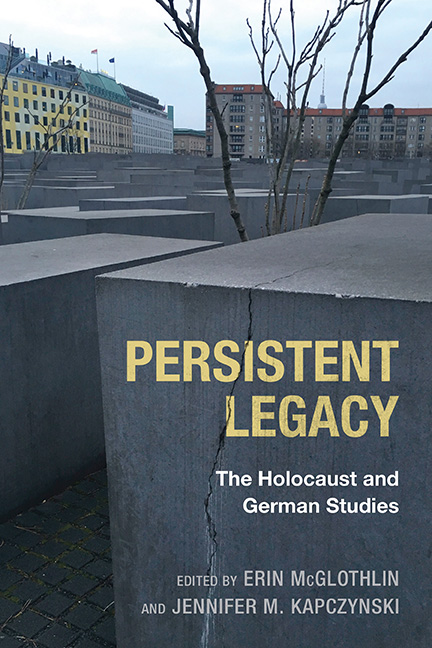Book contents
- Frontmatter
- Contents
- Acknowledgments
- Introduction
- Part I Abiding Challenges
- Part II The Holocaust in German Studies in the North American and the German Contexts
- Part III Disentangling “German,” “Jewish,” and “Holocaust” Memory
- Part IV Descendant Narratives of Survival and Perpetration
- Part V Remediated Icons of Memory
- Part VI Holocaust Memory in Post-Holocaust Traumas
- Notes on the Contributors
- Index
7 - The Power of Paratext: Jewish Authorship and Testimonial Authority in Benjamin Stein’s Die Leinwand
Published online by Cambridge University Press: 17 June 2021
- Frontmatter
- Contents
- Acknowledgments
- Introduction
- Part I Abiding Challenges
- Part II The Holocaust in German Studies in the North American and the German Contexts
- Part III Disentangling “German,” “Jewish,” and “Holocaust” Memory
- Part IV Descendant Narratives of Survival and Perpetration
- Part V Remediated Icons of Memory
- Part VI Holocaust Memory in Post-Holocaust Traumas
- Notes on the Contributors
- Index
Summary
SHORTLY AFTER THE PUBLICATION of his 2010 novel Die Leinwand (The Canvas, 2012), Benjamin Stein said in an interview with the German weekly Die Zeit:
Für mein Judentum … brauche ich keinen Zionismus und keinen Holocaust. Das spielt zwar eine Rolle, kommt aber von außen. Wenn sich jemand an mich wendet, weil er seine jüdische Identität sucht, dann sage ich ihm: “Versuche doch mal, Schabbes-Kerzen anzuzünden, und schau, was das mit dir macht.”
[For my Judaism … I need no Zionism and no Holocaust. These certainly play a role, but they come from the outside. If someone turns to me because he is searching for his Jewish identity, I tell him: “Try lighting Shabbat candles, and see what that does to you.”]
In many ways this quote captures the essence of Stein's literary project, which seeks to broaden the range of Jewish identities, and especially religious identities, that can be expressed in German-language literature. Indeed, Die Leinwand, the protagonists of which are two observant Jews from different cultural backgrounds, reintroduces into German literature the possibility of representing and affirming Orthodox Judaism as a way of life. Within contemporary German-Jewish fiction, Stein's novel is unique in its emphasis on the ways that Jewish law structures the everyday life of observant Jews and sets them apart from non-Jews.
The opposition Stein establishes in the quote between an embrace of religion and a focus on the Holocaust is nevertheless puzzling, given the actual plot of his novel. For Die Leinwand can be read as a commentary on the Wilkomirski affair, that is, the scandal that erupted in 1998 after Binjamin Wilkomirski's widely acclaimed Holocaust memoir Bruchstücke: Aus einer Kindheit, 1939–1948 (1995; published in English as Fragments: Memories of a Wartime Childhood, 1997) was exposed as a fake. The formation, fabrication, and transmission of memories are the central theme of Die Leinwand, which exemplifies the nexus between Holocaust remembrance and contemporary German-Jewish writing discussed throughout this book. Indeed, it is interesting to note that the German-Jewish author who most emphatically seeks to stake out a new authorial position—that of the Orthodox Jewish writer whose Jewishness is not primarily defined by the Holocaust—does so by thinking through questions of Holocaust testimony. This connection indicates that Holocaust remembrance is still widely seen as the principle task of contemporary German-Jewish writers.
- Type
- Chapter
- Information
- Persistent LegacyThe Holocaust and German Studies, pp. 141 - 156Publisher: Boydell & BrewerPrint publication year: 2016



